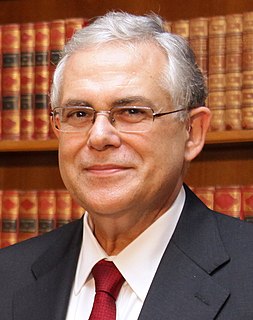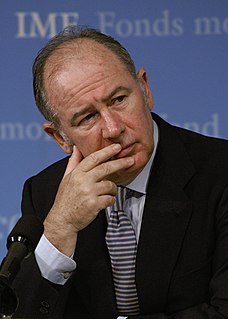A Quote by Milton Friedman
The problem is that, in a world of floating exchange rates, as Italy was before the euro, if one country is subjected to a shock which requires it to cut wages, it cannot do so with a modern kind of control and regulation system. It is much easier to do it by letting the exchange rate change. Only one price has to change, instead of many.
Related Quotes
The lesson for Asia is; if you have a central bank, have a floating exchange rate; if you want to have a fixed exchange rate, abolish your central bank and adopt a currency board instead. Either extreme; a fixed exchange rate through a currency board, but no central bank, or a central bank plus truly floating exchange rates; either of those is a tenable arrangement. But a pegged exchange rate with a central bank is a recipe for trouble.
If a country is an attractive place for foreigners to invest their funds, then that country will have a relatively high exchange rate. If it's an unattractive place, it will have a relatively low exchange rate. Those are the fundamentals that determine the exchange rate in a floating exchange rate system.
That day the U.S. announced that the dollar would be devalued by 10 percent. By switching the yen to a floating exchange rate, the Japanese currency appreciated, and a sufficient realignment in exchange rates was realized. Joint intervention in gold sales to prevent a steep rise in the price of gold, however, was not undertaken. That was a mistake.
Italy may well be the main problem. It has benefited most from the euro by having been able to get the euro interest rate instead of what otherwise would have been its own. That would be much higher because Italy has been accumulating so much debt. In the past, Italy has inflated away its debt. The virtue of the euro is that Italy can't do it alone. A tight ECB policy wouldn't permit that to happen again.
The IMF insisted that both Russia and Brazil maintain their currency at over-valued levels. Who are you protecting when you try to maintain that exchange rate by having high interest rates? You're protecting domestic and foreign firms that have gambled on the exchange rate. And who is paying the price? The small businesses that did not gamble [and no longer can afford loans], the workers who are going to be put out of jobs.
To be sure, the use of force by one party in a market transaction in order to improve his price was no invention of capitalism. Unequal exchange is an ancient practice. What was remarkable about capitalism as a historical system was the way in which this unequal exchange could be hidden; indeed, hidden so well that it is only after five hundred years of the operation of this mechanism that even the avowed opponents of the system have begun to unveil it systematically.






























